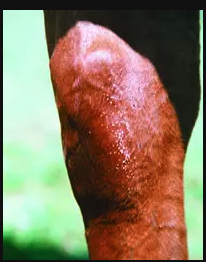FOR IMMEDIATE RELEASE
October 24th, 2018
Horsemen’s Laboratory,
John Byrd D.V.M.
Tel: 217-586-2004
Photos are available on request.
Media Contact:
Tel 607-434-4470
By Nikki Alvin-Smith
If your horse is bothered by bots you will most likely see small yellow, white or grey specks on your horse’s coat. These are eggs and may appear on your horse’s front legs, neck (mane and withers) or under his jaw. The eggs are laid on your horse’s coat by female flies that look a bit like honeybees, and the eggs will hatch into larvae when contacted by the saliva from a horse’s lips.
Other signs that your horse is infected with bots are excessive salivation, chewing issues and irritation of the mouth. A high population of bot larvae may even cause pus in the oral cavity. Not pleasant!
While horses can easily reach the deposited eggs on their front legs and consequently lick and ingest the eggs, given that most horses are not able to reach their own manes and wither area, grooming by another horse will enable transmission of eggs deposited at these locations to their respective lips and mouth.

As the eggs hatch into larvae they will burrow into the horse’s tongue, around teeth in gingival pockets and after 21 to 28 days will then molt and be swallowed by the horse and migrate to the stomach. Here they continue to develop while attached to the mucosal lining of the stomach and just past the stomach in the alimentary canal.
Amazingly aside from the mouth irritation the horse does not appear to experience discomfort or other issues from the ulceration that the larvae produce in the alimentary canal or stomach. A large population of bots hosted by the horse may cause many small ulcers that have the potential to become one large ulcer which could produce a colic risk, but this is unusual.
The larvae spend the winter inside the horse, to be excreted back onto the pasture during the warmer Spring months. Presence of bot larvae in horse fecal egg count test is seldom seen but certainly provides proof of bot infection. It is a good idea to deworm your horse once a year to mitigate bot populations. The ideal time to deworm the horse to break the life cycle of bot species is late Autumn, early Winter. A dose of Ivermectin or moxidectin should do the trick.
Meantime removal of the eggs visible on the horse’s coat will help defray the discomfort of these larvae stage bots reaching your horse’s mouth. There are many different methods for such removal. You can utilize a bot comb or bot knife, or carefully use a disposable razor. Lava stone grooming blocks act as a type of sandpaper and may successfully remove the eggs and the traditional method of wiping the eggs off with vinegar may work. Use gloves if you decide to pick them off by hand, you don’t want eggs underneath your fingernails! Bot eggs can be difficult to remove, so be patient.
If you apply mineral or baby oil to the horse’s coat after removing the visible eggs, more egg laying antics may be reduced.
PLEASE NOTE: This article is available for use in its entirety without edit, in any media format on condition that credit is given to Horsemen’s Laboratory, and author Nikki Alvin-Smith as a byline at the beginning of the article publication. Horsemen’s Laboratory URL address and Nikki Alvin-Smith URL is included. Horsemen’s Laboratory would appreciate notification of any publication.
This article is brought to you courtesy of Horsemen’s Laboratory Inc., Mahomet, IL. –
About Horsemen’s Laboratory: Established in 1993 by John Byrd D.V.M., an experienced lifelong horseman and a graduate of the University of Illinois College of Veterinary Medicine. As an equine medicine practitioner in California for 13 years, Dr. Byrd served as ex-officio member of the board of directors of the Pacific Coast Quarter Horse Racing Association where he also served as the organization’s official sales veterinarian. In addition, Dr. Byrd frequently officiated, as veterinarian for horse shows sponsored by the management of Orange County Fairgrounds in Costa Mesa, California. Dr. Byrd’s extensive experience with horses led him to observe how a horse’s health could impact performance leading to the founding of the specialist lab for equine fecal worm egg counts. Please visit for more information. Dr. Byrd enjoys sharing his wealth of knowledge of equine parasitology with horse owners from all walks of life, and is available to provide lectures/symposiums for your club, organization or event. Please contact Dr. Byrd via his website for rates and further information.
About Nikki Alvin-Smith: International and national published freelance writer and photographer in such world renowned publications such as The Chronicle of the Horse, Horse and Hound, Dressage and CT, Warmbloods Today, The Horseman’s Yankee Pedlar, Reiter, The Equine Journal, Spur, Hoofprints, Horsin’ Around, Horses All, Field & Stream, Western Horse and Gun, Pony Quarterly, Horses All Canada, Catskill Horse to name a few. Ghostwriting, blog services, PR/Marketing copy either direct with manufacturer or for agencies, copy editing and editor services also available. Nikki also produces catalog copy, white papers, e-books, corporate brochures and advertising copy for international corporations and PR/Marketing for celebrities.
As a Brit who has called the America home for the past 34 years, Nikki brings a unique perspective to the equestrian world. Nikki is also an accomplished Grand Prix dressage trainer/competitor, competing at international Grand Prix level to scores over 72% and is a highly sought clinician offering clinics worldwide. She has been a horse breeder/importer of warmblood and Baroque breeds for more than 25 years. Together with her husband Paul who is also a Grand Prix trainer, they run a private dressage breeding operation and training yard in the beautiful Catskill Mountains of New York. Please visit to learn more.






